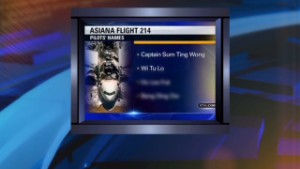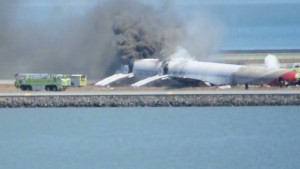The accomplished and respected Supreme Court justice, on the subject of hard core pornography, once offered this perceptive observation.
"It's hard to define, but I know it when I see it."
(CNN) -- The names, which some liken to slurs, spread everywhere -- triggering anger in the United States as well as South Korea.
Last week, KTVU, a TV station based in the San Francisco area, aired what it believed were the names of the Asiana Airlines Flight 214 pilots. A National Transportation Safety Board intern confirmed the bogus names -- phrases which sounded like "Something Wrong" and "We Too Low."
And hello, perfect storm. Or as one blogger put it -- "an epic mind-blowing fail."
The crash of the South Korean carrier had already hit racial notes -- with jokes mocking Asian driving or piloting skills and questions whether the crash had to do with the Korean culture.
U.S. comedian Bill Maher quipped on his show, "Now that we know the cause of that Asiana Airlines crash was the pilots flying too slowly, I don't want to hear another word about me doing Asian driver jokes." His comment followed an array of similar jokes on social media.
Phil Yu of the "Angry Asian Man" blog, said he was bracing himself for jokes after the crash.
"It's completely inappropriate especially because we're talking about a tragedy. People died, people were seriously injured," he said.
The crash prompted speculation as to whether the Korean cultural deference to authority played a role in bringing the Boeing 777 down on the San Francisco runway on July 6. This is a hypothesis made about Korean airlines long before the Asiana crash.
A blogger at Ask a Korean sarcastically asked: "What is it about American culture that contributed a local station with heavily Asian population to blindly buy the obviously false representation from the NTSB? Is there an inherent deference to authority in American culture that contributed to this gaffe?"
The bogus names prompted the South Korean carrier to say it would take legal action against KTVU, because "it was their report that resulted in damaging the company's image."
Several legal and PR experts questioned the wisdom of the lawsuit -- which the airline later said it would not pursue, while others on CNN's discussion board questioned whether the joke was even racist.
"Ah yes, the "r" word: racism. And the "o" word: offensive," wrote one commenter. "Get over it. A mildly clever person pulled a reasonably funny (if insensitive - to the victims of the crash) prank."
"I honestly believe nobody has a sense of humor anymore, and when someone does, they have to apologize for it. Get over it. It was hilarious!" another wrote.
Asian-American advocates say that creating vaguely Asian sounding names to crack jokes about a deadly plane accident that killed three Chinese girls is completely insensitive.
"Making up Asian names or mimicking foreign accents are not innocent forms of satire," wrote Paul Cheung and Bobby Calvan, of the Asian American Journalists Association. "Doing so demeans and hurts."
Racial jokes around the fatal air crash "are not benign," said Claire Jean Kim, an associate professor of political science and Asian American Studies at the University of California Irvine.
"Those kinds of jokes reflect a deeper view of Asian Americans as culturally different and inferior," she said. "That's not a joke, that has material effects. It leads to a general sense, even those who are born here in the U.S., they simply don't belong."
Kim says denying that something is racist is a sign of the times.
"People are minimizing it as a joke," she said. "In this particular period, many people claim that racism is a thing of the past, we live in a colorblind society, we should brush these things off."
The mocking of Asian names dates back to when immigrants arrived to the United States, said Gary Okihiro, founding director of the Center for Study of Ethnicity and Race at Columbia University.
"In the 19th century, many immigration officials who first greeted Asian migrants demeaned them, by first of all, making fun of their names because they couldn't pronounce them properly, or assigning them names like John Chinaman or China Mary," he said.
"Anything foreign seems to be open season or free game," Okihiro said.
I'm going to take a pass on putting a foot into the tar pit of "is it racist or not?", thank you.
I leave that to your own sensibility and/or moral compass to determine.
Couple of observations, though.
"...The bogus names prompted the South Korean carrier to say it would take legal action against KTVU, because "it was their report that resulted in damaging the company's image.....".
I'm not a credentialed P.R. "expert", but seems to me that if allowing a plane with three hundred people aboard and three pilots in the cockpit to crash because it was simply flying too low and slow doesn't fatally damage the company image, then stands to reason that the image will survive some low rent pranking.
And I think while there's no getting around the racial overtones of the joke, it's ill advised to over play the racist card, if only because too much crying race will inevitably have the same effect as crying wolf. And that would, and will, be a disservice to any and all who are obvious and genuine victims of racism in the future.
Finally, on the pointless debate on the tastelessness of the humor?
Let he or she who is without the habit of enjoying Here Comes Honey Boo Boo, Keeping Up With The Kardashians, Howard Stern or any of the hundreds of like cultural contributors cast the first stone.
Hmm.
Got kind of quiet all of a sudden, there, don't you think?
I'm going to take a pass on putting a foot into the tar pit of "is it racist or not?", thank you.
I leave that to your own sensibility and/or moral compass to determine.
Couple of observations, though.
"...The bogus names prompted the South Korean carrier to say it would take legal action against KTVU, because "it was their report that resulted in damaging the company's image.....".
I'm not a credentialed P.R. "expert", but seems to me that if allowing a plane with three hundred people aboard and three pilots in the cockpit to crash because it was simply flying too low and slow doesn't fatally damage the company image, then stands to reason that the image will survive some low rent pranking.
And I think while there's no getting around the racial overtones of the joke, it's ill advised to over play the racist card, if only because too much crying race will inevitably have the same effect as crying wolf. And that would, and will, be a disservice to any and all who are obvious and genuine victims of racism in the future.
Finally, on the pointless debate on the tastelessness of the humor?
Let he or she who is without the habit of enjoying Here Comes Honey Boo Boo, Keeping Up With The Kardashians, Howard Stern or any of the hundreds of like cultural contributors cast the first stone.
Hmm.
Got kind of quiet all of a sudden, there, don't you think?








No comments:
Post a Comment